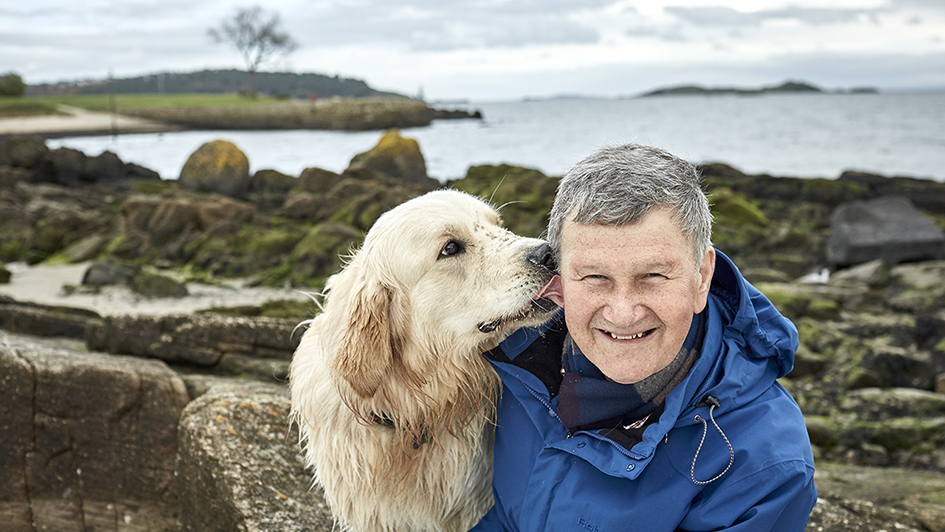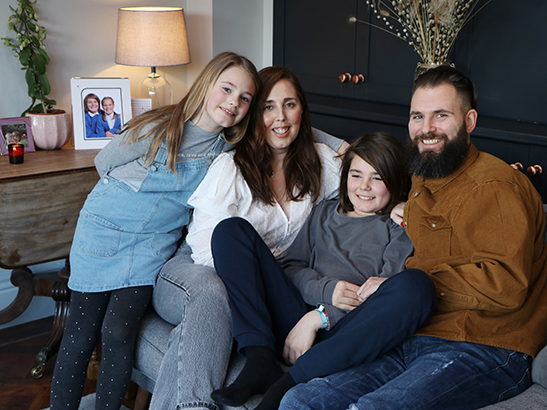Video: Sally Steadman-South is living with stage 4 melanoma. She tells her story.
Spending time with family is what cancer patients would most value if new treatments allowed them to live for longer, a new YouGov poll reveals.
Three quarters (74%) of cancer patients would want to use any extra time with family, just over half (51%) would spend time with friends, and 45% would like more time to travel.
Seeing a child or grandchild finish school or graduate from university was rated the top milestone they would like to reach by people living with cancer. Some 39% of cancer patients said they hoped that their treatment would give them the time to see this – something that so many proud parents and grandparents take for granted.
The Institute of Cancer Research, London, asked people who had been treated for cancer what they would want to do with the extra quality time they might get from advances in cancer treatment – as part of efforts to raise awareness of its ambitious plans for a new Centre for Cancer Drug Discovery.
This £75 million building aims to create new treatments that turn even advanced cancer into a disease that can be managed long term or cured.
We've lost many vital research hours to the coronavirus crisis but the need for our work continues to grow. Please help us kick-start our research to make up for lost time in discovering smarter, kinder and more effective cancer treatments, and to ensure cancer patients don't get left behind.
Helping to improve cancer survival
Nearly a quarter (23%) of people who had been treated for cancer valued spending time with pets, and around the same number (22%) would want extra time to help others by doing voluntary work.
The Institute of Cancer Research (ICR) also asked patients what they might want to finish or see finished in the extra time offered by new treatments. Among the accomplishments they wanted to complete, a third (32%) wanted to go to a dream holiday destination, and a quarter (24%) wanted to learn something new or a new skill.
Continued progress in cancer research is helping to improve cancer survival and the ICR believes new treatments designed to overcome cancer’s ability to evolve and become drug resistant can extend life and improve quality of life for many more patients.
For someone with incurable advanced cancer, new treatments that can help stop or slow the growth of the disease are essential and can help give patients more time.
'We don’t know what time we’ve all got together'
Mother of two Sally Steadman-South, from Sheffield, is living with stage 4 melanoma. She was initially diagnosed in 2014 at the age 34, after having a mole removed on her chest. Despite trying numerous treatments including surgery, radiotherapy and immunotherapy, the cancer continued to spread.
For the last two years she’s been on the targeted drugs, dabrafenib – a treatment underpinned by the ICR’s science – and trametinib, and currently has no evidence of disease.
Sally recently celebrated her 40th birthday with her family – a milestone she never thought she would reach:
“I spent a lot of time in the early days just thinking, ‘is this the last Christmas, is this my last birthday, is this the last time I’m going to get to sing happy birthday to my children?’ Within six months of starting the targeted drugs, I started feeling really well and had my first all-clear scan. I’ve been that way ever since.
“It’s not something I take for granted – every three months I have scans to check the status of my disease. But we feel like we can plan ahead a bit more. We’ve been to some amazing places in the last couple of years: we’ve gone as a family to Thailand and spent six weeks touring around Europe in a camper van.
“It’s important for us to see the world with the children, make incredible memories – things that we hope that they will never forget, because we just don’t know what time we’ve all got together.
“But my main ambition is to be here for school plays, seeing my son get to secondary school, seeing my daughter become a teenager – just the basic stuff that I just never thought I was going to be able to achieve.”
'Abiraterone has given me hope'
Rob Lester, from Fife in Scotland, was working as a GP when he was diagnosed with prostate cancer in 2012 at the age of 55. The cancer was advanced and had spread to the bone.
He’s now been on the targeted drug abiraterone for around eight years. It was discovered and jointly developed by the ICR, and has now gone on to benefit hundreds of thousands of men with prostate cancer around the world.

Rob (pictured above) says the treatment has allowed him to enjoy time he never imagined he would have:
“When I was first diagnosed, I honestly didn’t think I had much of a chance.I had hoped I would survive five years. But then I got abiraterone and that was like winning the lottery.
“Abiraterone has given me hope – not only have I survived, but I’ve been able to enjoy my life and have a great quality of life.
“I often don’t think about the cancer now. I’ve been able to take up things that I didn’t do before – I’ve joined a walking group and now we do walking holidays. We’re looking at the map and thinking of places that we’d like to go. I live what I would call a ‘normal’ life.
“For the future, I would really hope to keep living a bit longer, live a normal life and treat the cancer as something that you cope with, rather than something you fight.”
By the time Rob was diagnosed with prostate cancer in 2012, it had spread to his bones. He hoped that he might survive for 5 years. Thanks to abiraterone – a drug discovered and developed by the ICR – Rob’s been living well with cancer for seven and a half years.
Revolutionary cancer research
The ICR’s Centre for Cancer Drug Discovery will house the world’s first ‘Darwinian’ drug discovery programme aimed at overcoming cancer’s lethal ability to evolve and become drug resistant.
The ICR – a charity and research institute – has less than £10 million to raise in order to finish the Centre for Cancer Drug Discovery and equip it with the state-of-the-art facilities its scientists need for their pioneering research.
Scientists who will be working in the new centre believe its revolutionary approach can deliver long-term control and effective cures for cancer that are comparable to the progress made in HIV.
Professor Paul Workman, Chief Executive of The Institute of Cancer Research, London, said:
“Cancer doesn’t just affect a person’s physical health – for many families, including my own, it steals precious time and milestones you would have shared together.
“I lost both my parents to the disease. My father died of bowel cancer while I was a training to be a scientist. He never saw me finish my PhD or get married, and never got to meet his grandchildren.
“The revolutionary research we will be doing at our Centre for Cancer Drug Discovery will focus on overcoming cancer drug resistance.
“If we can do that and make cancer a manageable disease in the long-term, which is more often curable, we can give families more quality time and opportunities to create unforgettable memories together.”
